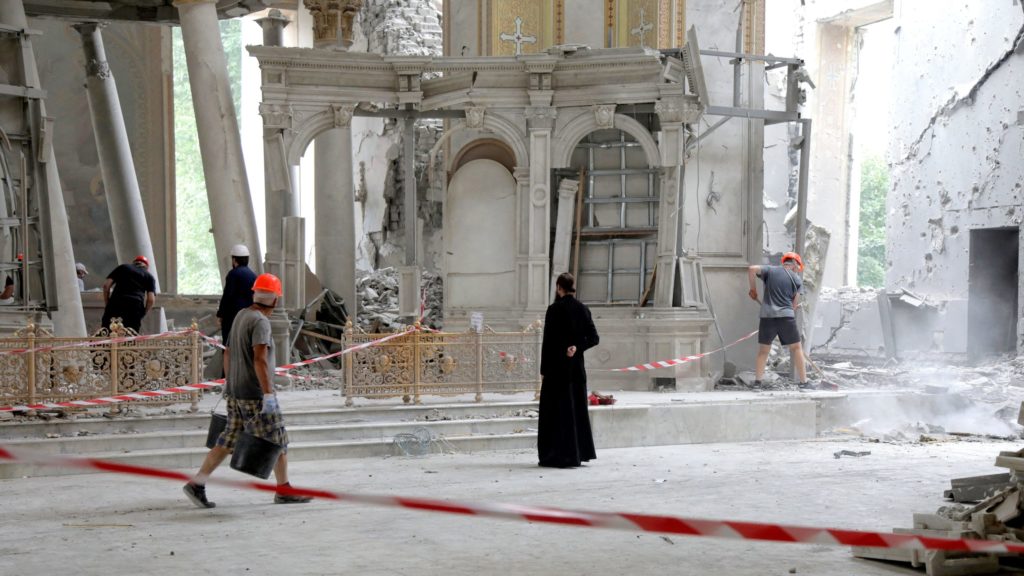Priests of the Ukrainian Orthodox Church have called for breaking ties with the Russian Orthodox Church, following a Russian attack on Odesa that destroyed a historic cathedral while killing two and injuring at least 22, including four children.
During the July 23 barrage, an X-22 anti-ship missile directly struck the central altar of the UOC's Holy Transfiguration Cathedral (Spaso-Preobrazhensky Cathedral). The cathedral building and the three lower floors were partially destroyed, while the interior and icons were significantly damaged.
Since abandoning the Black Sea Grain Initiative July 17 -- a deal brokered by Turkey and the United Nations to ensure vital grain supplies from Ukraine to Africa, the Middle East and Asia -- Russia has relentlessly targeted Odesa, the key port for such shipments.
The Odesa Diocese of the UOC condemned Russia's aggression against Ukraine, saying "this act of terrorism against the main shrine and spiritual heart of the city of Odesa -- the Holy Transfiguration Cathedral, around which peaceful civilians reside, and the cathedral itself -- is in no way connected with military facilities."
Ukraine President Volodymyr Zelenskyy noted that the cathedral -- consecrated in 1809 as the first and primary Orthodox church in Odesa -- had been "looted and destroyed by Bolsheviks" in 1936 and "restored in independent Ukraine."
"And now terrorists are trying to destroy it again," said Zelenskyy, who visited the ruined cathedral July 27.
Immediately after the attack, nearly 300 priests of the UOC-Moscow Patriarchate signed a letter to UOC Metropolitan Onufriy condemning the cathedral's destruction and urging an immediate, final break with the Russian Orthodox Church due to Russia's war on Ukraine, initially launched in 2014. The letter was published July 23 by the Ukrainian media outlet Glavkom.
"We will never see thousands of Ukrainians under the sunny sky again, never write a lyrical poem, never give a flower to a loved one, never hold our own child in our arms," the letter said. "All this unimaginable human suffering, all this horror, is happening in the name of Satan's 'justice' from the marshes of Moscow! How sad it is, but our Church did not find an adequate response to these words of the Patriarch."
Close to 80% of Ukraine's population identifies as Orthodox, but that affiliation has become increasingly complex in light of Russia's decade of aggression against Ukraine, which began in 2014 with attacks on the Donbas region and the attempted annexation of Crimea.
In January 2019, Ecumenical Patriarch Bartholomew I of the Constantinople Patriarchate – the "first among equals" of the Orthodox churches -- formally recognized the independence of the Orthodox Church of Ukraine, distinct from the UOC.
A few months prior, he had restored Metropolitan Filaret, head of the UOC-Kyiv Patriarchate -- an independent Orthodox church in Ukraine -- to full communion. In response, the Russian Orthodox Church, led by Patriarch Kirill, a close ally of Russian President Vladimir Putin, severed communion with Constantinople.
The UOC, which had historically remained loyal to Russia, broke with the Moscow Patriarchate in May 2022 over Kirill's vigorous endorsement of Russia's war on Ukraine. The patriarch has blessed Russian troops and claimed their death in battle "washes away all sins."
"We do not want to suffer for Russia, Putin, or Kirill," said the priests in their letter. "And most of us have the impression that our persecution is for them, not for Christ."
Despite the May 2022 break with Moscow, Ukrainian officials remain wary of the UOC and lingering loyalty to Russia, and have continued investigations into ties between the church and Moscow.
In their letter, the priests asserted there had been "no real rupture" between the UOC and Moscow, and demanded that Metropolitan Onufriy take a definitive stand on the relationship between the two churches.
Metropolitan Onufriy -- who in April was found to hold what he described as an unused Russian passport from his student days – expressed his condolences over the cathedral attack in a July 23 message, urging "patience and fervent prayer" to "tame our anger" and not let it "turn into blind hatred."
On July 28, Ukraine's parliament, the Verkhovna Rada, considered draft legislation that would move to ban the UOC-Moscow Patriarchate, reviewing a bill outlawing religious organizations that operate in Ukraine but have headquarters outside the country "in a state that carries out armed aggression against Ukraine."

